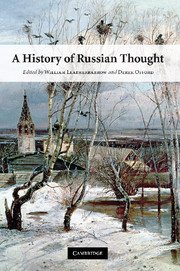Book contents
- Frontmatter
- Contents
- Preface
- List of contributors
- Dates, transliteration and other conventions
- Dates of reigns
- Russian titles of journals, newspapers and miscellanies
- PART I CONTEXT
- 1 Introduction
- 2 The political and social order
- 3 Russian intelligentsias
- PART II INTELLECTUAL CURRENTS
- PART III THEMES AND CONSTRUCTS
- PART IV THE AFTERLIFE OF CLASSICAL THOUGHT
- Biographical details of thinkers and writers
- Selected bibliography
- Index
3 - Russian intelligentsias
Published online by Cambridge University Press: 05 June 2012
- Frontmatter
- Contents
- Preface
- List of contributors
- Dates, transliteration and other conventions
- Dates of reigns
- Russian titles of journals, newspapers and miscellanies
- PART I CONTEXT
- 1 Introduction
- 2 The political and social order
- 3 Russian intelligentsias
- PART II INTELLECTUAL CURRENTS
- PART III THEMES AND CONSTRUCTS
- PART IV THE AFTERLIFE OF CLASSICAL THOUGHT
- Biographical details of thinkers and writers
- Selected bibliography
- Index
Summary
The word intelligentsiia appeared in the Russian language in the early eighteenth century, carrying the meaning ‘alliance’, ‘compact’ or ‘agreement’. By the 1730s, however, the poet Trediakovsky had associated the word root with the Latin word intelligentia, a word he translated into Russian as razumnost' (rationality). According to the linguist Viktor Vinogradov, Trediakovsky helped fix the basic semantic sense of the term intelligentsiia thereafter: that is, the word became associated with ‘reason’, ‘rationality’ and ‘education’. In the mid-eighteenth century the freemason Johann Georg Schwartz often used intelligentsiia to connote the ‘highest capacity of human beings as sentient creatures’. In the early nineteenth century the philosopher Galich incorporated it into his History of Philosophical Systems with the meaning ‘rational spirit’. In 1836 the term appeared in a diary entry by Zhukovsky, as a collective noun connoting members of Russia's educated Europeanised elite. According to the historian Sigurd Shmidt, Zhukovsky's concept of the intelligentsia connoted ‘not only belonging to a certain socio-cultural milieu and having a European education, but also a certain moral outlook and behaviour – that is, intelligentnost’ in the later meaning of the term'. Still, so far as we know, uses of intelligentsiia as a collective noun remained infrequent until the 1860s: the first edition of Dal's comprehensive Russian dictionary (published 1863–8) contained no reference to the word.
- Type
- Chapter
- Information
- A History of Russian Thought , pp. 44 - 70Publisher: Cambridge University PressPrint publication year: 2010
- 3
- Cited by

